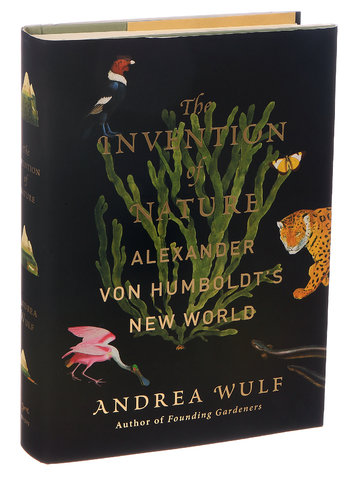Beliefs and the environment
I wanted to share some thoughts on reading The Invention of Nature: Alexander von Humboldt’s New World by Andrea Wulf, one of the New York Times’ 10 best books of 2017.

Andrea Wulf’s the Invention of Nature
Who is Alexander von Humboldt? The New York Times review of the book explains:
Alexander von Humboldt was the pre-eminent scientist of his time. Contemporaries spoke of him as second in fame only to Napoleon. All over the Americas and the English-speaking world, towns and rivers are still named after him, along with mountain ranges, bays, waterfalls, 300 plants and more than 100 animals. There is a Humboldt glacier, a Humboldt asteroid, a Humboldt hog-nosed skunk. Off the coast of Peru and Chile, the giant Humboldt squid swims in the Humboldt Current, and even on the moon there is an area called Mare Humboldtianum. Darwin called him the “greatest scientific traveler who ever lived.â€
Huge in his time but little known today, despite indirect influence on us through Darwin, Thoreau, and Muir, among others.
I’ll post three or four reflections in the next few days, mostly from short passages. The first is from mainstream views of nature in Europe in Humboldt’s time, the late 1700s, illustrated by Humboldt’s adventures in South America:
Humboldt would see again and again how humankind unsettled the balance of nature. Only a few weeks later, deep in the Orinoco rainforest, he would observe how some Spanish monks in a remote mission illuminated their ramshackle churches with oil harvested from turtle eggs. As a consequence, the local population of turtles had already been substantially reduced. Every year the turtles would lay their eggs along the river’s beach, but instead of leaving some eggs to hatch the next generation, the missionaries collected so many that with each passing year, as the natives told Humboldt, their numbers had shrunk. Earlier, at the Venezuelan coast, Humboldt had also noticed how unchecked pearl fishing had completely depleted the oyster stocks. It was all an ecological chain reaction. “Everything,” Humboldt later said, “is interaction and reciprocal.”
Humboldt was turning away from the human-centered perspective that had ruled humankind’s approach to nature for millennia: Aristotle, who had written that “nature has made all things specifically for the sake of man“, to botanist Carl Linnaeus who had still echoed the same sentiment more than 2,000 years later, in 1749, when he insisted that “all things are made for the sake of man“. It had long been believed that God had given humans command over nature. After all, didn’t the Bible say that man should be fruitful and “replenish the earth and subdue it: and have dominion over fish of the sea, and over fowl of the air, and over every living thing that moveth upon the earth”? In the seventeenth century the British philosopher Francis Bacon had declared, “The world is made for man,” while Rene Descartes had argued that animals were effectively automata—complex, perhaps, but not capable of reason and therefore inferior to humans. Humans, Descartes had written, were “the lords and possessors of nature.”
I bolded some parts that described beliefs. I wish I could say these beliefs were of that time, but they are as alive today as ever, at least in the United States. I like to think other countries don’t believe them as much, but I’m sure plenty do.
Beliefs guide behavior, influence emotion, and determine values
If you believe that nature is there for us and maybe that supernatural forces will replenish them defying the laws of physics, it would make sense to do what you wanted without regard to your effect on others or future generations.
As far as I can tell, as long as the world was big enough relative to the size of a human or, for that matter, relative to all human societies, following the beliefs above worked. If we ate a species to extinction or chopped down so many trees to undermine society, we could move to areas with more resources. No problem.
Today, Earth has few to no remaining areas of wilderness to start using. The old approximations don’t work.
More than not working, the approximations seem to be driving our cultures to collapsing from overshooting the Earth’s capacity.
Leadership and the Environment
These beliefs led to systems based on not caring about your environmental effects on others or future generations. They worked until we ran out of space and other resources. Making them work for our world, not a past or imaginary world, means changing systems.
Changing elements of a system doesn’t generally change the system. To change the system you have to find a leverage point, such as the beliefs and behaviors of influential people—people at the level of Oprah, Barack, and Elon.
The challenge in changing their behavior, I believe, and assuming they care about how their environmental actions affect others, is in helping them change their beliefs and behaviors based on that caring. Knowing their beliefs I invite them to act on them.
A big goal is to overcome the beliefs and goals driving our systems. GDP growth is a major driving force. Should it be?
One of my big challenges, given how many people seem unwilling to act on the environment, is to identify and help surface deep beliefs people have and help them, if willing, see how beliefs such as the ones above affect themselves and others.
They’re obvious in hindsight. They may be more subtle today, but certainly many people believe them.
We’ve changed beliefs on that scale before. Many of our ancestors believed the world was flat, that we were at the center of the universe, that drinking before driving was safe, and that slaves liked being slaves.
Read my weekly newsletter

On initiative, leadership, the environment, and burpees
Pingback: Thoreau on not traveling | Joshua Spodek